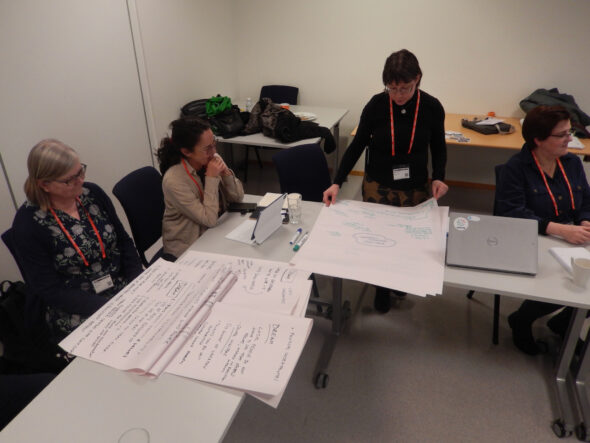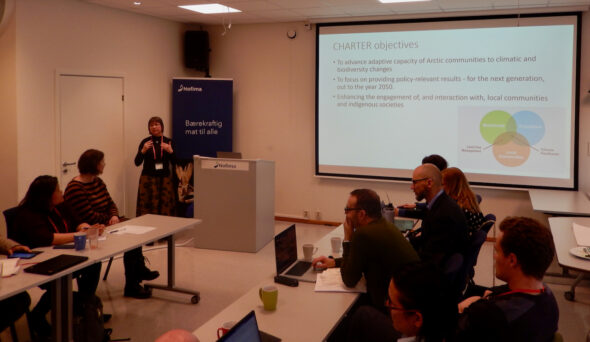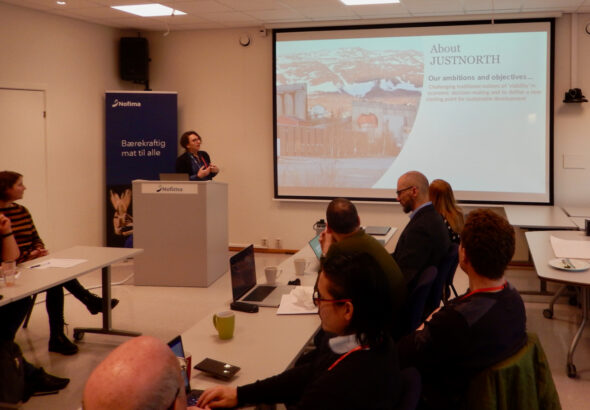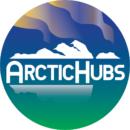
On the fringes of the annual Arctic Frontiers event in Tromsø, a smaller gathering of related projects converged at the offices of our partner the Norwegian Institute of Food, Fisheries and Aquaculture Research (NOFIMA), where we seized an opportunity to consider the synergies arising from our overlapping research themes.
Four projects @ArcticHubs, @JustNorth, @CharterArctic and @ArcticPassion all form part of the EU Horizon funded Polar Cluster of research (#EUPolarCluster), and, with a common partner in the shape of the Arctic Centre in Rovaniemi,
they have come together to form an ‘action group’ focusing on the themes of land-use, reconciliation and justice in the Arctic.
The key themes of fairness, adaptation, cooperation, conflict, and collaboration, recur across all the projects of this sub-cluster, but with differences of context and emphasis.
Working in small groups circulating around three themed sessions, each hosted by a different project, the meeting aimed to learn from the diverse methodological approaches and research orientations applied across the projects to these common themes.
The Futures session, facilitated by ArcticHubs’ Dr Seija Tuulentie, sought insights on the opportunities, threats, and dreams or aspirations for possible futures in the Arctic.
The session chaired by Dr Sirpa Rasmussen of CHARTER gathered perspectives on adaptive responses to Environmental Change in the region, exploring the nature of adaptive capacity, as well as the limitations to adaptation. Finally, Corine Wood-Donnelly, of Just North, probed the implicit Land Use Values underlying stakeholder attitudes to past harms and injustices, and their significance in land use planning and decision making today.

Each of the sessions reprised or tested methods and data-gathering instruments employed in different projects and work packages – including Delphi-type scenario building adopted by ArcticHubs, the use of playing card discussion prompts, and interactive software to visualise emerging collective responses in real time.
The ‘green transition’ featured prominently in all the sessions, as both an opportunity and a potential threat to the region.
The EU’s drive towards a green energy revolution, combined with its push towards the conservation of ‘pristine’ landscapes, was identified as raising new dilemmas in the balancing of conservation with the exploitation of natural resources. The quest for carbon-neutral energy gives rise to new resource conflicts: on-shore and off-shore wind turbines create problems for animals and marine species, as well as for the people who make their living from them, whilst the lag in the development of sustainable technology means that wind turbines cannot be currently recycled or reused. At the same time, improvements in transport connectivity and technology can generate expansion in sectors such as tourism and the circular economy, creating demand for a skilled, educated workforce which could reverse the region’s population decline, and address the existing imbalance in gender opportunities.
Responding to these dilemmas will require the region’s stakeholders – local communities, policy and decision makers, business and industry leaders, and researchers themselves – to adopt new ways of working, with an emphasis on building the capacity for co-operation and co-creation.

At the heart of all the projects is the development and application of innovative and adaptive research tools to foster collaboration and the co-creation of new solutions, including data sharing platforms and more inclusive research technologies; at the same time, seeking ways to turn what were traditionally regarded as ‘subjects of research’ into partners and co-creators of research.
This fruitful first meeting in Tromsø demonstrated how much each project has to learn from the others in the cluster, and what is to be gained, both individually and collectively, by getting together to share insights, findings and experiences.
We look forward to our new Action Group building further on this in the future!

